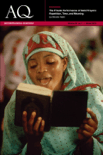
ANTHROPOLOGICAL QUARTERLY
Scope & Guideline
Fostering Interdisciplinary Dialogues in the Arts and Humanities
Introduction
Aims and Scopes
- Cultural Anthropology and Social Practices:
The journal explores diverse cultural practices and social norms across various societies, emphasizing the significance of local contexts and meanings. - Political Ecology and Environmental Anthropology:
A strong focus on the interactions between human societies and their environments, addressing issues of sustainability, resource management, and ecological justice. - Health and Illness in Societal Contexts:
Investigation into how cultural beliefs, social structures, and economic conditions influence health outcomes, including the impact of pandemics and healthcare systems. - Ethnographic Methodologies:
Utilization of ethnographic research methods to understand the lived experiences of individuals and communities, fostering an in-depth exploration of social phenomena. - Interdisciplinary Approaches:
Integration of insights from various disciplines, including sociology, political science, and history, to enrich anthropological analyses and discussions. - Critical Examination of Power and Identity:
Analysis of how power dynamics shape identities, social relations, and cultural expressions, particularly in postcolonial and transnational contexts.
Trending and Emerging
- Impact of COVID-19 on Cultural Practices:
A significant trend is the exploration of how the COVID-19 pandemic has reshaped cultural practices, rituals, and experiences of grief, revealing the adaptability and resilience of communities. - Environmental Justice and Climate Change:
Increasing focus on the intersections of anthropology with environmental issues, particularly how climate change affects marginalized communities and the politics of resource management. - Digital Anthropology and Technology:
Emerging discussions around the influence of digital technologies on social interactions, governance, and cultural expressions, highlighting the anthropological implications of a digital world. - Migration and Transnationalism:
A growing emphasis on understanding migration patterns, experiences of displaced populations, and the complexities of identity in an increasingly interconnected world. - Gender and Sexual Politics:
An upsurge in research addressing gender identities, sexual politics, and the intersections of these with cultural practices, reflecting broader social movements and changes.
Declining or Waning
- Traditional Ethnographic Studies:
While ethnography remains vital, there appears to be a decline in papers focused solely on traditional ethnographic descriptions without critical analysis of broader societal implications. - Eurocentric Perspectives in Anthropology:
There is a noticeable waning of papers that center exclusively on Western cultural paradigms, as the journal increasingly emphasizes global and non-Western viewpoints. - Historical Anthropology:
Research that solely focuses on historical narratives without connecting them to contemporary issues is becoming less frequent, as there is a greater push towards relevance and applicability. - Theoretical Anthropology Without Empirical Data:
Papers that discuss anthropological theories in isolation from empirical research are declining, indicating a preference for evidence-based discussions that ground theory in real-world contexts. - Purely Descriptive Studies of Rituals:
There is a reduction in studies that merely describe rituals without exploring their socio-political implications or contemporary transformations, reflecting a shift towards more analytical approaches.
Similar Journals
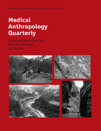
MEDICAL ANTHROPOLOGY QUARTERLY
Cultivating Understanding of Health in Diverse ContextsMedical Anthropology Quarterly is a premier academic journal published by Wiley, dedicated to advancing the interdisciplinary field of medical anthropology. With an ISSN of 0745-5194 and an e-ISSN of 1548-1387, this highly esteemed journal encompasses a wide array of topics at the intersection of health, culture, and society, reflecting the complexities of medical practices across diverse populations. As a testament to its impact, it boasts a Q1 ranking in Anthropology and a strong performance in related fields, landing at #37 in Social Sciences Anthropology according to Scopus rankings, placing it in the top 92nd percentile of its category. Published quarterly, Medical Anthropology Quarterly serves as a critical platform for researchers, professionals, and students alike, fostering rigorous academic discourse and providing insights relevant to contemporary health issues. While it does not offer open access options, the journal's wide circulation and esteemed reputation make it an invaluable resource for anyone engaged in the study of health and culture. Join the ongoing scholarly conversation that shapes our understanding of health in a global context, as we continue to explore the dynamic interplay between medical practices and human experiences.

Boletin Antropologico
Exploring the Rich Tapestry of Latin American CulturesBoletin Antropologico, published by UNIV LOS ANDES, is a vital academic journal dedicated to the field of anthropology, focusing on the diverse cultural practices, social structures, and historical contexts of societies, particularly within Latin America. With its ISSN of 0257-750X, this journal aims to provide a platform for researchers and scholars to disseminate their findings and engage in meaningful discussions that advance the understanding of anthropological issues. Although Boletin Antropologico currently does not follow an open-access model, it remains a significant resource for professionals seeking peer-reviewed content that reflects rigorous academic standards. With a commitment to fostering intellectual growth and collaboration among anthropologists, the journal serves as an essential reference for students and practitioners keen on exploring the rich tapestry of human cultures and societies.

Cambridge Journal of Anthropology
Advancing anthropological insights for a global audience.Cambridge Journal of Anthropology is a prestigious and internationally recognized journal published by BERGHAHN JOURNALS, dedicated to advancing the field of anthropology. The journal, with ISSN 0305-7674 and E-ISSN 2047-7716, has embraced an Open Access model since 2020, ensuring that groundbreaking anthropological research is easily accessible to scholars, practitioners, and students worldwide. With a commitment to enriching the academic discourse in anthropology, the journal welcomes high-quality articles that contribute to both theoretical and applied aspects of the discipline. The Cambridge Journal of Anthropology serves as a vital resource for researchers eager to explore contemporary anthropological issues, fostering an inclusive dialogue on cultural diversity, social structures, and human experiences. As scholars increasingly turn to open platforms for disseminating their work, this journal stands out as a leading venue for innovative research that shapes the future of anthropology.
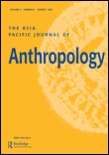
Asia Pacific Journal of Anthropology
Unveiling the Complexities of Human SocietiesAsia Pacific Journal of Anthropology is a premier academic journal dedicated to advancing the field of anthropology and cultural studies, published by Routledge Journals, Taylor & Francis Ltd. With an ISSN of 1444-2213 and E-ISSN 1740-9314, this journal has gained recognition for its rigorous scholarly contributions since its inception in 2000. Situated in the UK, it is strategically positioned to serve as a vital resource for researchers, professionals, and students exploring the rich complexities of human societies and cultures within the Asia Pacific region and beyond. As evidenced by its Q2 ranking in both anthropology and cultural studies for 2023, alongside its impressive Scopus ranks—#218 among 1304 in Cultural Studies and #157 among 502 in Anthropology—this journal illustrates a strong commitment to delivering high-quality, impactful research. While it is not an open-access journal, it remains a key platform for disseminating innovative research and fostering academic dialogue, thereby significantly contributing to the advancement of knowledge in the social sciences.
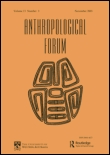
Anthropological Forum
Cultivating Scholarly Excellence Since 1963Anthropological Forum, an esteemed journal in the field of anthropology, is published by Routledge Journals, Taylor & Francis Ltd. With an ISSN of 0066-4677 and an E-ISSN of 1469-2902, the journal has cemented its reputation for fostering critical discussions and innovative research since its inception in 1963. Covering a broad range of topics within anthropology, it has achieved an impressive Q1 ranking in the category of Anthropology and a Q2 ranking in Arts and Humanities (miscellaneous) in 2023, showcasing its pivotal role in advancing scholarly discourse. With a Scopus ranking placing it in the top 10% of its field, the journal provides valuable insights into contemporary anthropological issues, making it an essential resource for researchers, professionals, and students alike. Although not an open-access journal, the comprehensive studies and articles published within its pages contribute significantly to the academic and professional community. Addressed out of Milton Park, Abingdon, UK, the Anthropological Forum remains a seminal platform for disseminating high-quality anthropological research.
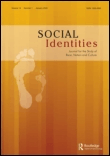
Social Identities
Pioneering Research on the Evolution of Social IdentitiesSocial Identities is a distinguished academic journal published by Routledge Journals, Taylor & Francis Ltd, dedicated to advancing the understanding of social identities from a multidisciplinary perspective. With an ISSN of 1350-4630 and an E-ISSN of 1363-0296, this journal stands out in the sociology and political science disciplines, as evidenced by its impressive Q2 ranking and a Scopus percentile of 64th. Spanning from 1995 to 2024, it continually fosters scholarly discourse on the complexities of identity formation, representation, and the interplay between various social dynamics. Although the journal currently does not offer Open Access options, it remains a valuable resource for researchers and professionals seeking in-depth analysis and critical insights. Based in the United Kingdom, Social Identities is a vital platform for both emerging scholars and established experts dedicated to exploring the nuances of how identities shape social structures and experiences.

Anthropological Notebooks
Illuminating the Rich Tapestry of Human SocietiesAnthropological Notebooks, published by the SLOVENE ANTHROPOLOGICAL SOC, is a noteworthy journal within the field of anthropology. Established in Slovenia, this journal aims to provide a platform for scholarly dialogue and dissemination of anthropological research, fostering interdisciplinary approaches and global perspectives. Although it currently holds a Q4 quartile ranking in anthropology and ranks #421 out of 502 in Scopus, it serves as an essential conduit for emerging voices and innovative ideas in the discipline. Covering research published from 2010 to 2019 and from 2021 to 2024, the journal invites contributions that explore diverse cultural narratives and anthropological insights. Despite its limited open access options, Anthropological Notebooks remains a crucial resource for researchers, professionals, and students seeking to engage with contemporary anthropological discourse and enrich their understanding of human societies.
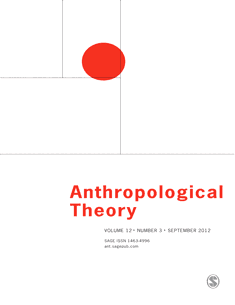
Anthropological Theory
Transforming Theories into Global InsightsAnthropological Theory, published by SAGE Publications Ltd, stands at the forefront of the field of anthropology, delivering cutting-edge research and critical analyses that shape contemporary understanding of human societies. With its ISSN 1463-4996 and E-ISSN 1741-2641, this distinguished journal boasts an impressive impact factor and has been recognized in the Q1 quartile category across both anthropology and arts and humanities disciplines, reflecting its high citation rates and scholarly influence. Covering a wide range of topics from cultural practices to social dynamics, Anthropological Theory serves as an essential resource for researchers, professionals, and students alike, fostering a rich dialogue within the academic community. The journal's continuous publication since 2001 ensures a dynamic platform for emerging theories and methodologies, providing invaluable insights for those engaged in anthropological discourse. Its recognition within the top percentile rankings of Scopus further underscores its significance and attractiveness to contributors seeking to disseminate their work on a global stage.

Economic Anthropology
Bridging Disciplines for a Deeper Economic UnderstandingEconomic Anthropology, published by WILEY, is a leading journal dedicated to advancing the interdisciplinary understanding of economic practices through anthropological research. With an ISSN of 2330-4847, this journal navigates the intricate connections between economic systems and cultural contexts, providing a platform for both theoretical and empirical studies since its inception. As a testament to its scholarly impact, it holds a Q1 ranking in Anthropology and a Q2 ranking in Economics and Econometrics as of 2023, positioning it among the top journals in these fields. The journal ranks #86 out of 502 in Social Sciences for Anthropology and ranks #338 out of 716 in Economics, reflecting a significant percentile positioning of 82nd and 52nd respectively. Although the journal operates under a subscription model, its comprehensive scope and dedicated attention to emergent economic phenomena make it a vital resource for researchers, professionals, and students who seek to deepen their insights into the economic dimensions of human behavior and social structures. Join the community of scholars contributing to this dynamic field as you explore innovative perspectives on the intersection of culture and economy.
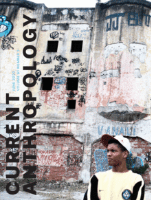
CURRENT ANTHROPOLOGY
Pioneering Discussions in Cultural ResearchCURRENT ANTHROPOLOGY, published by the esteemed University of Chicago Press, stands as a premier journal in the fields of anthropology and archaeology, with an impressive impact factor that signifies its relevance and authority in the academic community. With both print (ISSN: 0011-3204) and digital formats (E-ISSN: 1537-5382), this journal provides a platform for groundbreaking research, theoretical advancements, and critical discussions that shape our understanding of human cultures and societies. Since its inception in 1962, CURRENT ANTHROPOLOGY has continually pushed the boundaries of knowledge and inquiry, earning a prestigious Q1 ranking in 2023 across multiple categories, including Social Sciences and Archaeology. Researchers and professionals alike rely on this journal not only for its rigorous peer-reviewed articles but also for its commitment to interdisciplinary approaches and innovative methodologies. While not currently offering open access, CURRENT ANTHROPOLOGY remains an essential resource for students and scholars eager to stay abreast of the latest developments in anthropological research.